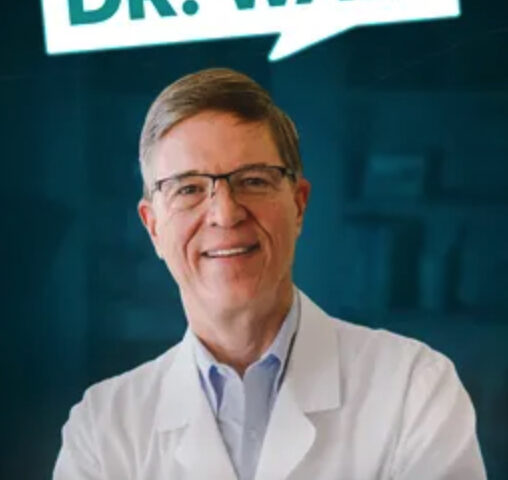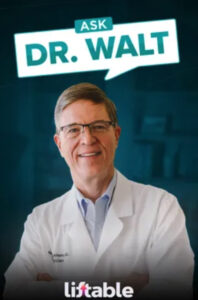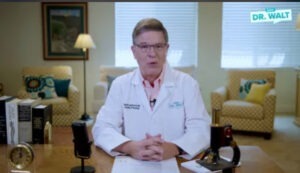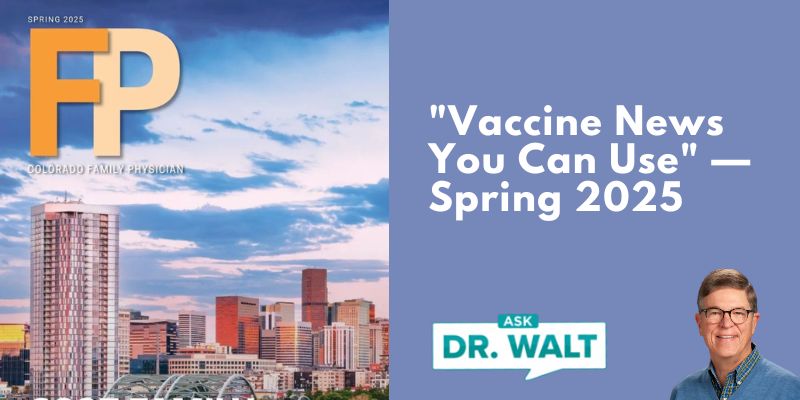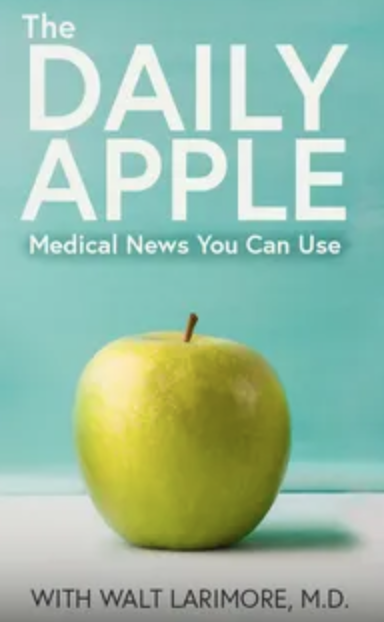
Question: Is a high cholesterol linked to increased dementia risk?
November 10, 2023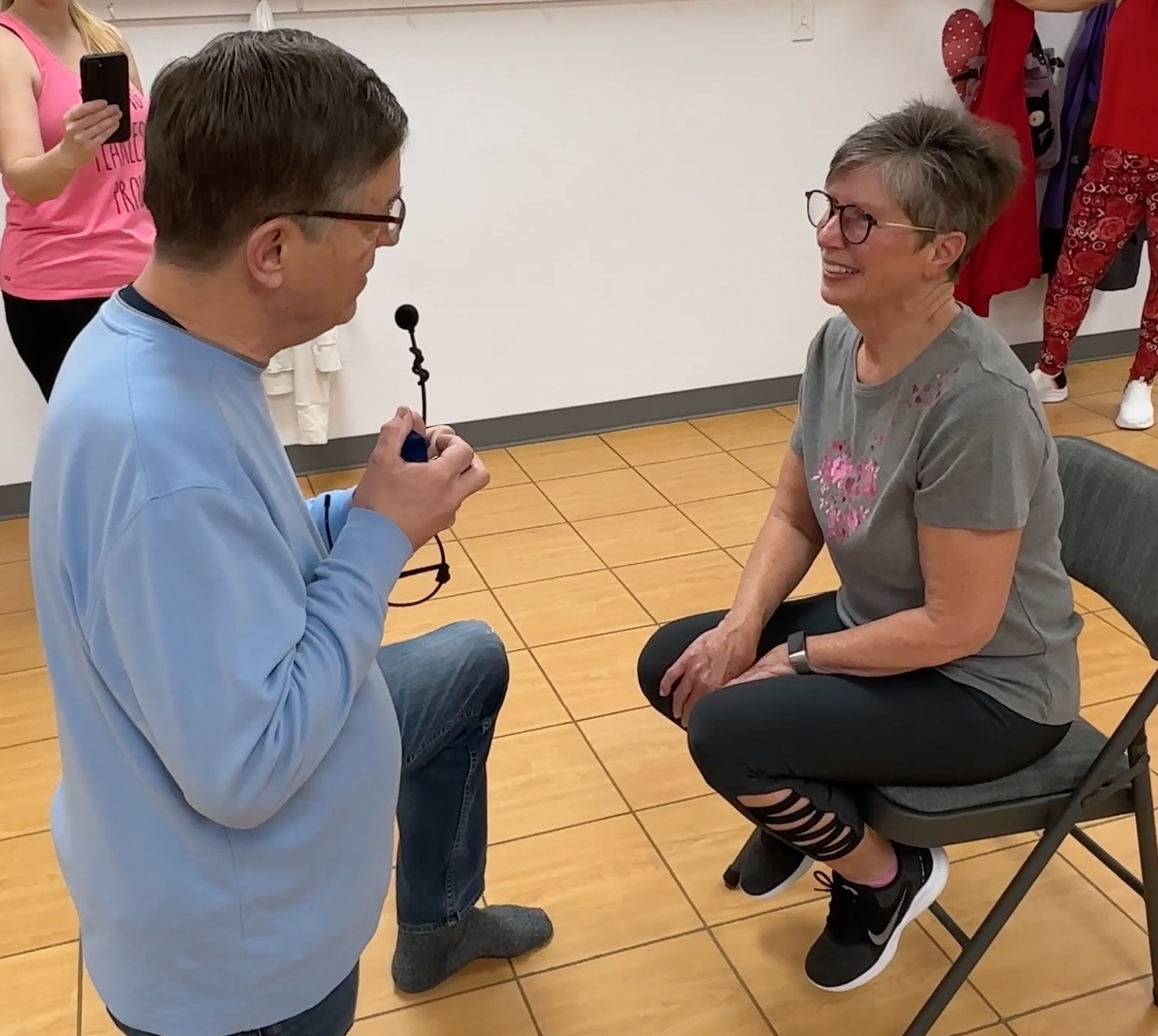
2nd Chance Proposal — 50 years later
November 15, 2023Ask Dr. Walt 27 – Natural Medicines for Upper Respiratory Infections like a cold or the flu
The “common cold” is aptly named as nearly everyone catches colds. The U.S. population experiences nearly one billion colds annually. Children usually have about six to ten colds per year. Adolescents and adults have two to four. Common colds are the main reason that children miss school and adults miss work. Conventional medicine doesn’t have a lot to offer for treatment of the cold, so as a result, many people turn to natural medicines. Does anything work? We’ll talk about that on today’s edition of Ask Dr. Walt.
From 2021-2022, I was honored to host a TV show on LiftableTV, “Ask Dr. Walt.”
The “common cold” is aptly named as nearly everyone catches colds. The U.S. population experiences nearly one billion colds annually. Children usually have about six to ten colds per year. Adolescents and adults have two to four. Common colds are the main reason that children miss school and adults miss work. Conventional medicine doesn’t have a lot to offer for treatment of the cold, so as a result, many people turn to natural medicines. Does anything work? We’ll talk about that on this edition of Ask Dr. Walt.
You can click below to watch a video of the show, or I’ve put the show transcript at the end of the blog if you’d prefer.
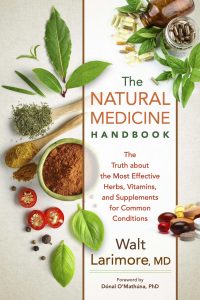
CLICK TO LEARN MORE about this book
Disclaimer: The Ask Dr. Walt show is designed for entertainment purposes to give information on various medical conditions, treatments, and procedures for your personal knowledge and to help you be a more informed consumer of medical and health services.
SHOW TRANSCRIPT
SHOW 27
Natural Medicines for Upper Respiratory Infections
GUEST INTERVIEW
Tod Cooperman, MD
TEASE:
The “common cold” is aptly named as nearly everyone catches colds. The U.S. population experiences nearly one billion colds annually. Children usually have about six to ten colds per year. Adolescents and adults have two to four. Common colds are the main reason that children miss school and adults miss work. Conventional medicine doesn’t have a lot to offer for treatment of the cold, so as a result, many people turn to natural medicines. Does anything work? We’ll talk about that on today’s edition of Ask Dr. Walt.OPEN:
Hi, everyone. I’m family physician Dr. Walt Larimore. More than 200 different viruses can cause colds. The rhinovirus is the most common. It is responsible for thirty to fifty percent of all colds. Rhinovirus infections can occur throughout the year but peak in April to May and again in September. But they continue throughout the fall and winter. During the autumn months, rhinoviruses cause eighty percent of all upper respiratory infections.
The viruses causing colds are spread directly by physical contact, such as shaking hands and touching doorknobs, and indirectly through airborne transmission from coughs or sneezes. They can also spread indirectly from environmental surfaces such as desktops, countertops, keyboards, telephones, and doorknobs. Subsequent touching of the eye, nose, mouth, tongue, or lips can easily and quickly lead to infection.
The bottom line is that nearly everyone exposed to a cold virus becomes infected. So, avoiding exposure in the first place is much better than the best cold treatments available. The good news is that there are several safe, effective, and simple cold and flu prevention tactics:
- Avoid people who are ill as much as possible.
- Wash hands with soap and water frequently, especially when around infected patients or in public places. How long should you and your children wash your hands? As long as it takes to sing “Happy Birthday”! Alcohol-based hand sanitizers are another good option.
- Avoid touching your eyes, nose, mouth, or lips to prevent self-inoculation of cold and flu viruses.
- Keep work, bathroom, and home surfaces clean with disposable disinfecting wipes. Be sure the label says it works against cold and flu viruses.
But, if you or someone in your family comes down with the common cold, , common treatments for the symptoms of the common cold include staying hydrated, getting rest, gargles or lozenges for a sore throat, saline or decongestant drops for nasal congestion, warm liquids like grandma’s chicken soup, and pain or fever relievers like acetaminophen, ibuprofen, or naproxen. However, none of these traditional suggestions will shorten the duration of a cold and some have side effects. It’s no wonder so many folks turn to natural medications. The good news is that there are several possible treatments that have some evidence for both reducing symptoms and speeding recovery from the common cold although only by a day or so. If you choose to take or to give your children a natural medicine, an herb, vitamin, or supplement, what might work and what does not?
To help navigate between literally thousands of options is our guest today, Tod Cooperman, MD. Dr. Cooperman is an internationally recognized and respected researcher, writer, and speaker on consumer healthcare issues. Dr. Cooperman earned his MD from the Boston University School of Medicine. Early in his career, he founded ConsumerLab.com. It’s the leading independent evaluator of dietary supplements and nutritional products.
- Dr. Cooperman, welcome back to “Ask Dr. Walt.”
- First let’s talk about natural medicines to prevent the common cold. Some of the more popular substances include echinacea, vitamins C or D, and zinc. What’s the latest on these products in the prevention for cold prevention?
- A lot of my patients use zinc lozenges. What’s the latest on them?
- As I understand it, the majority of, but not all, clinical studies show about a one and a half day decrease in the duration of symptoms of the common cold when adults take zinc gluconate or zinc acetate lozenges containing 13 to 23 mg of elemental zinc per dose taken every two hours while awake. Is that an accurate appraisal?
- On ConsumerLab.com, you say that for zinc gluconate or acetate, an adult has to take more than 75 mg per day for at least three days. And furthermore, the lozenges must be started within forty-eight hours of symptom onset. Correct?
- Also, I’ve been told other forms of zinc lozenges such as zinc citrate or zinc ascorbate have not been shown to be effective?
- I usually recommend to my patients on of the two of ConsumerLab.com’s “Top Picks.” Cold-EEZE®, which contains 12 mg of zinc gluconate per lozenge, so a person would have to take seven lozenges over fourteen hours to get over 75 mg at about $1.88 per day. The second product is Zicam Cold Remedy Ultra Crystals, which contain 14.5 mg of zinc gluconate and acetate per packet, so a person would have to take six over twelve hours to get over 75 mg, at about $4.26 per day. Given that Zicam has zinc acetate, which does not work for the common cold, should I recommend that or just recommend the Cold-EEZE?
- Tod, ConsumerLab.com also “Approved” Nature’s Way Zinc Lozenge and points out it has the lowest cost for zinc in an “Approved” product at about 62 cents per day. What keeps it from being a “Top Pick”?
- What side effects are common with zinc lozenges?
- And oral zinc tablets do not work, correct?
- Case reports and animal research have linked intranasal zinc sprays and gels to permanent loss of sense of smell. In fact, one popular zinc nasal spray was removed from the market in the U.S. due to over 130 reports of loss of smell. Should people avoid these products?
- Wow, our time is flying by. Let’s hit the second product I recommend to my patients: Vitamin C. There has been substantial controversy among doctors in the past about the effectiveness of Vitamin C for treating the common cold. However, as I understand it now, the majority of evidence shows that taking high doses of Vitamin C orally might decrease the duration of cold symptoms by one to one and a half days in some patients. True or false?
- Also, I’ve been told that there may also be a dose-dependent response: doses of at least 2,000 mg daily seem to work better than 1,000 mg. True or false?
- On ConsumerLab.com you warn that the high doses used for treating colds, 2,000 to 3,000 mg daily, can increase the risk of side effects, such as diarrhea and abdominal upset, kidney stones or damage, and interactions with some prescription drugs. Any updates on that information?
- In your most recent tests, ConsumerLab.com tested 31 vitamin C products and 10 percent failed due to containing much more Vitamin C than indicated on the label. However, this is an improvement over earlier when 27 percent of the products failed.
- One of the things I love about ConsumerLab.com, is that you help consumers find not only products that are safe and effective, but those that are the best value. For example, you point out that a common dose of Vitamin C, a 500 mg tablet, from a high-quality supplement can cost as little as one cent to over one dollar. What are your “Top Picks” for vitamin C?
- Tod, I know you like to emphasize whenever I use information from ConsumerLab.com for my articles, blogs, talks I give to doctors, or here on the TV show, that consumers should always consider checking this information at ConsumerLab.com, because you guys are updating the site literally every day. It is a subscription site, so how much does it cost folks? Are group rates for neighborhoods, faith communities, or libraries available?
SAY GOOD-BYE TO DR. COOPERMAN:
Before we close the show, I want to tell you about a couple of books I’ve written on natural medicines and alternative medicine: The Natural Medicines Handbook: The Truth about the Most Effective Herbs, Vitamins, and Supplements for Common Conditions, a book in which Dr. Cooperman served as a consultant and editor, and Alternative Medicine: The Christian Handbook, both of which have been endorsed by the Christian Medical and Dental Associations as “medically-reliable and Biblically sound.” You can find them at DrWalt.com. Just click on the tab that says books. Finally, if you have comments or questions drop me a line at DrWalt@Liftable.TV. That’s DrWalt@Liftable.TV.
So, until our next visit, “Dear friend, I pray that you may enjoy good health and that all may go well with you, even as your soul is getting along well.” I’m Dr. Walt Larimore and I look forward to seeing you for my next episode of “Ask Dr. Walt.”
Disclaimer: The “Ask Dr. Walt” show is designed for entertainment purposes to give information on various medical conditions, treatments, and procedures for your personal knowledge and to help you be a more informed consumer of medical and health services.
© Copyright WLL, INC. 2023. This blog provides healthcare tips and advice that you can trust about a wide variety of general health information only and is not intended to be a substitute for professional medical advice, diagnosis, or treatment from your regular physician. If you are concerned about your health, take what you learn from this blog and meet with your personal doctor to discuss your concerns.

